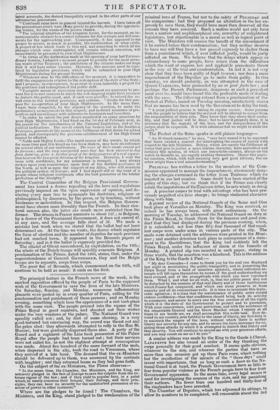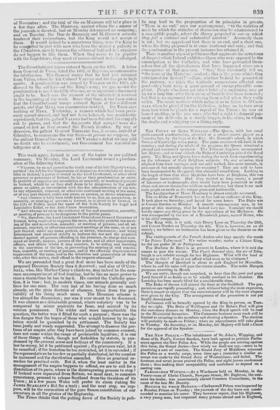condemnation and punishment of these persons; on Monday evening, something
which bore the appearance of a riot took place with the same view. The people pressed into the square of the Palais Royal in great numbers, and shouted out their wishes under the very windows of the palace. The National Guard was speedily called out; and, by dint of some shoving, in a very good-natured but convincing way, the crowd was thrust out and the gates shut : they afterwards attempted to rally in the Rue St. Honore, but were gradually dispersed there also. A party of the Guard and a regiment of the Line took possession of the Palais Royal after the people had been turned out ; but their services were not called for, as not the slightest attempt at reoccupation was made. About five hundred of the more forward of the mob, when dispersed in the city, took the road to Vincennes, where they arrived at a late hour. The demand that the ex-Ministers should be delivered up to them, was answered by the sentinels with laughter ; and they returned home as they had gone forth. On the subject of the ex-Ministers, the Times observes- " In the mean time, the Chamber, the Ministers, and the King, are solemnly pledged in the face of Europe to save the culprits from the ex. treme rigour of the law ; and if they yield to popular fury, in a point which so nearly concerns their honour, their feelings, and their prin- ciples, they can have no security for the undisturbed possession or ex- ercise of power in other instances."
Where are the pledges to be found ? The Chambers, the Ministers, and the King, stand pledged to the amelioration of the The principal feature in the French news of the week, is the marked opposition offered by the people of Paris to the supposed wish of the Government to save the lives of the late Ministers. On Saturday, Sunday, and Monday, numerous inflammatory placards were posted up in every quarter of Paris, calling for the criminal laws of France, but not to the safety of POLIGNAC and his companions : had they proposed an alteration in the law ex- pressly to save them, they would have more than deserved all the censure they have received. Such a motive would not only have been a narrow and unphilosophical one, unworthy of enlightened legislators, but objectionable in a moral as well as logical point of view. The Ministers will receive the benefit of the amendment if it be carried before their condemnation ; • but they neither deserve to have nor will they have a law passed expressly to shelter them from a punishment which, if ever inflicted justly, would he justly inflicted on them. We believe that the delays which appear so extraordinary to some people, have arisen from the difficulties which the want of express law and applicable precedents throw in the way of the trial and condemnation, In fact it is not very clear that they have been guilty of high treason; nor does a mere impeachment of the Deputies go to make them guilty. In this country, we should probably, as was attempted in the case of Queen CAROLINE, have proceeded by an ex post facto law ; and perhaps the French Parliament, dangerous as such a precedent must ever be, would have found this the preferable mode of dealing with the case. The following extract from a proclamation of the Prefect of Police, issued on Tuesday morning, satisfactorily shows that no means has been used by the Government to delay the trial.
" A great judicial process is taking its regular. course. Some persons wish the people to believe that the accused will be allowed to escape from the responsibility of their acts. They know that they abuse their credu- lity, and that justice will be done; but to have-it properly done, it is necessary that the majesty of the laws, and the independence of the judges, shall be respected. It is with calmness that we ought to abide the result."
The Prefect of the Seine speaks in still plainer language- " An ill-timed measure," he says, " may have caused it to be supposed that there existed a concert for interrupting the course of justice with respect to the late Ministers. Delays, which are merely the fulfilment of forms that give to justice a more solemn character, have accredited and fortified this opinion, of which our intractable enemies, always on the watch to disunite us, are eagerly availing themselves. Hence this popu- lar emotion, which, with well-meaning men §nd good citizens, has no other origin than a real misunderstanding."
POLIGNAC has written a letter to the members of the Com- mission appointed to manage the impeachment, strenuously deny- ing the charges contained in the letter from Toulouse which we inserted in our last number. Some doubt has been started of the policy of this step ; but we think that if the Prince can clearly refute the imputations of theToulouse letter, lie acts wisely in doing so. A prisoner comes to trial with advantage who has been pre- viously acquitted of a false charge ; he brings vindicated character along with him. A grand review of the National Guards of the Seine and Oise took place at Versailles on Monday. The King was received, as indeed he has always been, with great enthusiasm. On the morning of Tuesday, he addressed the National Guard on duty at the Palais Royal, to thank them for the firmness and good con- duct that they had displayed during the previous evening, when, it is calculated, not less than fitly-four thousand of that excel- lent corps were under arms in various parts of the city. The mails were detained until the addresses were printed in the Moni- teur ; and another detention took place in consequence of a state- ment in the Quotidienne, that the King had suddenly left the Palais Royal, under the. influence of alarm at the tumults of Monday. A printed slip was inserted in each paper, stating in three words, that the assertion was a falsehood. This is the address of the King to the Garde a Pied:— "My dear Comrades—I come to thank you for the zeal you displayed last night in maintaining the public tranquillity, and in preserving the Palais Royal from a band of senseless agitators, whose ridiculous at- tempts will fall upon themselves by means of the good understanding we have evinced, and of the promptitude with which you have repressed them. What I, and what we all wish, is, that the public peace may not be disturbed by the enemies of that real liberty and of those institutions which France has conquered, and which can alone preserve us from anarchy and all its concomitant evils. It is time to terminate this deplo- rable agitation ; it is time that the maintenance of public order should restore confidence—that that confidence should bring back its activity to commerce, and secure to every one the free exercise of all the rights which it is the duty of the Government to protect and to guarantee. With your concurrence, with your patriotism, and with the assistance of the respectable General and the brave Marshal whom I rejoice at all times to see beside me, we shall accomplish this noble task. Ever de- voted to my country, ever faithful to the cause of liberty, my first duty is to maintain the empire of the laws, without which there is neither liberty nor security for any one, and to secure the force necessary for re- sisting those attacks by which it is attempted to disturb that liberty and that security. You will continue to second me with your generous efforts, and you may count on me as I do you" A similar address was made by the King to the Garde a Cheval. LAFAYETTE has also issued an order of the day thanking the corps generally for their good conduct. It seems quite obvious, whatever be the aim, and whoever the parties that have on more than one occasion got up these Paris rows, which nothing but the recollection of the miracle of the " three days " could invest with importance, that so long as such a force as the Na- tional Guard is at hand, the French Government have as little to fear from popular violence as the French people have to fear from Government oppression. In the mean time, every legal means is used for investigating the sources of the riots, and for punishing their authors. No fewer than one hundred and thirty-four of the ringleaders have been arrested. The Chamber of Deputies, which has adjourned its sittings, to allow its numbers to be completed, will reassemble about the 3rd of November; and the trial of the ex-Ministers will tale place in a few days after. The Ministers, against whom the clamour of the journals is directed, had on Monday determined on resigning; and on Tuesday, the Due de BROGLIE and M. GUIZOT actually tendered their resignations, but the King would not accept of them. it would indeed be a monstrous thing, were tie King to be compelled to part with men who have the utmost p polarity in the Chambers, merely because the editors of half-a-dezee ofpapers do not happen to like them. When they cease to i e popular with the Legislature, they must of course submit to be dseharged.



























 Previous page
Previous page